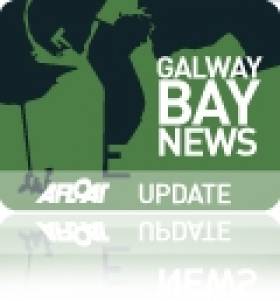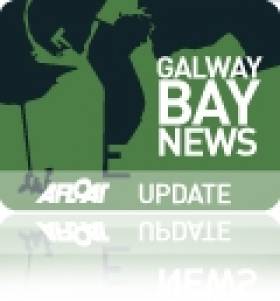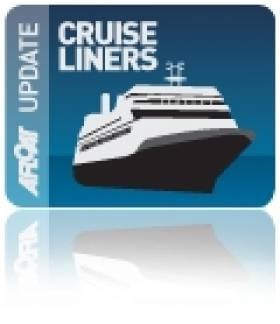Displaying items by tag: Galway Harbour and Bay news
Three’s A Crowd as Naval, Research and Cargo Ships Dock In Galway
Also sharing the basin but located closer to the dock gates was Arklow Shipping Ltd's Dutch registered dry-cargo vessel Arklow Surf (2000/2,316grt). The dock is capable of handling more vessels simultaneously and of course used as a host-port of the high-profile Volvo Ocean Race which is due to return next year.
Galway and neighbouring Limerick City with its Ted Russell Dock, are the only dock-gate accessed ports on the island of Ireland. In the case of Galway there is an exception as freight operations are also available from an outer pier on the seaward side of Dún Aengus Dock though only for domestic purposes. From this pier the dedicated Aran Islands freight service is operated by Lasta Mara TEO's Blath na Mara (1983/330grt). As for Limerick, vessels can also berth outside the dock but they tend to be small port-work related craft that use the outer berth on the Shannon Estuary.
The Galway Harbour Company in recent years have proposed plans for a new outer port, to be built in four stages with a completion date set for 2017. This would enable larger deeper drafted vessels such as tankers and cruiseships to dock in the new port. In the meantime cruiseships anchor off Mutton Island. In addition a freight rail-link, berthing for an inshore fishing fleet and a 216 berth marina are proposed.
To read more about the port proposals visit http://www.galwayharbour.com/news.php?id=11and for aerial visual impressions click HERE.
- River Shannon
- Marine Institute
- naval service
- Ports and Shipping
- Arklow Shipping Ltd
- Ports and Shipping News
- Aran Islands
- Island News
- Galway Bay News
- Marine Science News
- Dun Aengus Dock
- Galway Harbour Company
- Cruise Liner news
- Cruise ships
- Galway Harbour and Bay news
- Ted Russell Dock
- Marine Instistute Research vessels
- Lasta Mara TEO
Galwegian Special Olympian Athletes Celebrate On board Navy's Flagship
The world games which were held during June and July saw over 7,500 athletes from 185 countries participate in the Greek capital. Team Ireland in total brought home 107 medals, with athletes from Galway securing 11 medals and a number of ribbons in a variety of sports.
Speaking about the reception, Regional Director Myra Merrick said: "We are honoured to have the Naval Service docking in Galway especially for the function. The athletes deserve a warm reception and recognition for their wonderful success. It's a huge achievement in itself to participate at World Games level, let alone bring back a medal".
"The event presents an exceptional opportunity for the public to extend congratulations to our local sporting heroes, explore the Defence Forces vessel and meet the officers" she added.
The 1984 built /1,910 tonnes 'helicopter patrol vessel' and her seven fleetmates are all each assigned to a particular charity. In the case of L.E. Eithne she is associated with Our Lady's for Sick Children, Crumlin in Dublin.
Cruise-Goers Head for the Galway Races
The vessel first visited Galway in 2009 but this call will be her last year operating under the Spirit of Adventure cruise banner. The company are to replace the vessel next season with the Saga Pearl II which will be transferred from the parent company Saga Cruises and renamed Quest for Adventure.
Prior to the Spirit of Adventurer's call, the 226 passenger Le Diamant arrived from St. Malo last Friday. She became the first vessel to make a call to the 'City of the Tribes' on behalf of her French operators, Cie de Ponant. Her passengers were taken on tours of the city, Connemara and the Aillwee Caves in neighbouring Co. Clare. The vessel is due to return early next month.
With three cruise-calls this year the port is set to increase this figure to 7 in 2012 arising from the ports campaign over the last two years. Paul Carey, Chairman of the Harbour Company, said "We are beginning to see the fruits of this campaign and look forward to growing Galway's association with the return of the majestic passenger liners to Galway".
"The passenger liner The World has been confirmed for a two-day visit in August 2013 which is a great endorsement of Galway as a cruise destination".
The call by the world's first ocean-going luxury resort vessel will also be another first for Galway. Operators of the 43,524gt vessel, Residences at Sea have made previous Irish ports of call to include Dublin, for more on her to the capital last August click HERE.
- Dublin Port
- Galway Bay
- Foynes
- Shannon Estuary
- The World
- Cruiseships
- Ports and Shipping News
- city of the tribes
- Galway Harbour
- Galway Harbour News
- Mutton Island
- Le Diamant
- Cruiseliners
- Saga Cruises
- Spirit of Adventure Cruises
- Spirit of Adventure
- Galway Harbour and Bay news
- Galway Port
- Port of Galway Company
- Ponant Cruises
- Galway Races
- The Galway Races Ballybrit
- Ballybrit Race Course
- Port of Foynes
- Saga Pearl II
- Quest for Adventure
- Shannon Estuary and port news
- The World cruise liner
- Residences at Sea
- The World Residences at Sea
- Irish cruise ports of call
- Irish cruise calls
- Cruiseships to Ireland
- Cruise Companies visiting Ireland
- West of Ireland cruise callers
































































